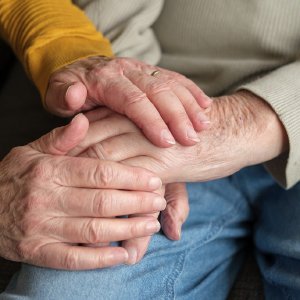Opinion: Meeting at the edge

A remnant of an ancient red oak surrendering to winter in the author’s yard. Jean Stimmell / Courtesy
| Published: 02-16-2025 6:00 AM |
Jean Stimmell is a retired stone mason and psychotherapist living in Northwood. He blogs at jeanstimmell.blogspot.com and jstim.substack.com.
“Most live as though life was something yet to come. But as John Lennon pointed out, ‘Life is what happens while we are busy making other plans,” — Steven Levine
In an age when a relentless stream of catastrophic news threatens to engulf us, it is not uncommon for older individuals like myself to take solace in the belief that we are the fortunate ones destined to depart this world before the worst arrives. This sentiment reflects a cultural narrative that equates the inevitability of death with a diminishing concern for the events that shape our lives.
Fortunately, this notion is wrong.
Stephen Levine, the author of one of my favorite inspirational books, “A Gradual Awakening,” brought this cultural fiction to my attention. Contrary to the belief that old age diminishes our engagement with the world, Levine argues that being close to death paradoxically does the opposite: It heightens the significance of each moment we inhabit.
Levine’s Buddhist insights on the transient nature of life resonate with elderly persons like me because, as new ailments pile up, they repetitively remind us our time is near. In my case, I have an assortment of afflictions, including three kinds of cancer. While none are life-threatening or terminal at this point, one will surely do me in.
Yet, in the face of that, a funny thing has happened.
Rather than tuning out — as I feign when making small talk with my friends — these increasingly stark reminders of my mortality are waking me up. They make me ever more passionately alive to the present, savoring everything, including a spat with a loved one, the expressive shadows on the virgin snow blocking my driveway and the slapstick comedy acts that I regularly perform, prompted by my rickety body and sieve-like mind.
Article continues after...
Yesterday's Most Read Articles
 ‘There was no oversight’: NH child advocate has been a watchdog for children's care. Now, the office is on the chopping block
‘There was no oversight’: NH child advocate has been a watchdog for children's care. Now, the office is on the chopping block
 Volunteer group wants to help homeless clean up their camp
Volunteer group wants to help homeless clean up their camp
 ‘Less finger pointing, more communication’: Longtime Chichester residents share hopes before second town meeting
‘Less finger pointing, more communication’: Longtime Chichester residents share hopes before second town meeting
 Casella Waste Systems’ landfill project in New Hampshire’s North Country denied permit
Casella Waste Systems’ landfill project in New Hampshire’s North Country denied permit
 New Healthy Buffalo owner to build market in Chichester
New Healthy Buffalo owner to build market in Chichester
 ‘It’s everything’: In largest rally yet, Trump protestors descend on Concord
‘It’s everything’: In largest rally yet, Trump protestors descend on Concord
Levine suggests that this is nature’s way of preparing me for what’s to come: to “penetrate the illusion of solidity which potentiates the fear of death, the fear of dissolution upon the extinction of the physical body.”
He emphasizes that accepting my mortality can serve as a catalyst for surrendering to life’s fleeting nature. As I recently wrote in this space, we think we control our destiny, but in reality, our lives are a fluke, unfolding according to their own rhyme and rhythm.
As I learn to surrender to life, I find it an invitation to engage more authentically and fully with life, not less. But that wasn’t always so.
When I was young and macho, I considered surrendering worse than death: I pictured myself never standing down, like Davy Crockett fighting to the end at the Battle of the Alamo. The worst thing I’ve ever experienced was not in Vietnam but the one time I took LSD, a massive dose at that. I totally lost grip of who I was or where I was. I felt myself flailing uncontrollably into an abyss, a bottomless void. I was beyond terrified. My friends told me I kept repeating this mantra as my only lifeline to reality: “I am insane...I am insane.”
Now, in old age, I understand surrender better. Surrender, however, does not mean shutting down, averting my eyes from the constant drumbeat of atrocities taking place around the world, like the thousands of children dying daily from bullets and famine.
Surrendering to what is beyond my control does not excuse me from bearing witness to the suffering all around me — and grieving it.
Margaret Renkl, the New York Times columnist, asked children’s author Kate DiCamillo how she “keeps letting herself be heartbroken without becoming broken forever.” She answered: “I fall into the mineshaft of despair over and over again.” Yet, DiCamillo also said something always pulls her out.
“A stranger who looks me in the eye and smiles, a grandparent who tells me about reading aloud to their grandchild,” she concluded. “I’ve learned to let the beauty of the world and the bravery of other people pull me up and out of the despair.”
I think that’s the key.
By surrendering to the present moment, we bear witness to the whole ball of wax: the traumatic moments as well as the awesome ones of beauty, bravery and devotion.
In my way of thinking, that’s what it means to be fully human.







 Opinion: Courage and care count
Opinion: Courage and care count
